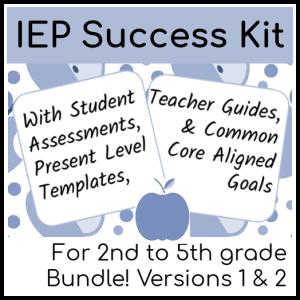Ask Rose: How do you support paraprofessionals?
How do you support paraprofessionals? Trainings? Meetings/check ins? Collaboration with general education teachers and paras?
Working with paras can be one of the most complex aspects of a special education teacher’s job! One challenge is that para responsibilities vary wildly district to district and state to state, which means that if you switch where you teach you might need a whole new support style! In my sister’s district, paras were not allowed to run groups at all. Full stop. In mine, they ran more than I did! A second challenge is that many paras have way more years of experience in districts than the teachers they work with but way less training– most only have high school diplomas and districts rarely invest resources in training paras. That can make things awkward at best. Like, you might have someone who has twice your years of experience and their own ways of doing things looking at you sideways when you try to ram your model of instruction or behavior management down their throat. For more on that, check out the thriving post on treating paras as colleagues!
So, back to the question, how do you support paras?
All of these options– trainings, meetings/check-ins, and collaboration with general education teachers– are awesome. Here are my thoughts on each:
- District trainings: District trainings for paras are often few and far between and sites almost never have resources to provide sub coverage for paras who go (or, like we experienced at one of my sites, the subs are so bad you would rather have no one). If there are district trainings, however, they are worth being a body down for a day or a bad sub. The key ones for me were on behavior management and on inclusion. The behavior management ones were often open to teachers and paras and hugely helpful. Without the trainings most paras, like most of us, are just drawing on their knowledge of what worked for them or works with their own children and those techniques often fail with more complex kiddos. The inclusion ones were rare but often hit on a lot of the key issues like not being super loud in someone else’s class– and it was super helpful for folks to hear it from someone who wasn’t me.
- Site trainings: To pull this off, you need to do some hour tweaking. While teachers’ schedules include half days for trainings, para schedules typically only cover the direct hours they work with kids. If you get creative though, you can often pull 15 or so minutes a week to cover a monthly training. Five minutes a day of later arrival or earlier departure can get you almost two hours a month for trainings and meetings, which is often really, really worth it. Site trainings can include having folks from the district (like behavior specialists!) come out and do group trainings. It can also include a formal PD that you or someone else at your site creates– like a school psychologist could do a training on behavior management strategies. Site trainings should focus on issues that are coming up for multiple paras at a site and be action focused– they go better if you focus on strategies folks can use than on problems at the site. Food helps too 🙂
- Meetings and check-ins: I often did monthly 15 minute group meetings right before school started or after school to get take everyone’s pulses. A lot of times there is no time during the day for paras to check in about issues they are encountering. Most paras have schedules that have them come in with the students and leave with the students– which means that unless they are using their own time, you don’t get to talk to them outside of the chaos of the day. I would often have a super informal agenda related to site issues I had noticed (like testing was coming up and were there changes folks wanted from the year before), but mostly the point was to hear from folks about issues I might be missing so we could problem solve. One on one check ins are also great– at one site where I had fewer paras, I had 10 minute meetings or so every week with one of my paras and it was insanely helpful for keeping us on the same page and keeping me ahead of site drama.
- General education teacher pulse checks: I know the question asked about collaborations with general education teachers, butI was reminded of this one during a classroom observation a few years ago. I was in a general education teacher’s classroom watching a one-on-one check his email. ALL CLASS. Every day. I don’t think I saw him talk to the student he was working with more than once. I loved the teacher of that class, but the teacher was low drama. There was no way the teacher was going to go running to the special education teacher who supported that para or a department chair. The school had a great special education program, but one key piece that was missing was pulse checks. Special education teachers are stretched thin, but if you don’t go and ask general education teachers about how the staff (as well as the students!) are doing, you are going to have staff who get paid to sit on email rather than helping students.
- Collaboration with general education teachers and paras: TBH I have only used this when there are problems that need a mediation. I find the check ins with each individually to be more useful because I get more of the real deal. One of the biggest challenges is pairing paras and general education teachers well. You often have little control over this but if you do have control– try not to put the loud para with the quiet obsessed teacher or vice versa. It doesn’t end well. The three ways can be useful if a particular student has an issue and you want to group problem solve it. It is waaaay less useful if there is an interpersonal problem between the teacher and para (unless you are way more skilled than me at conflict mediation between adults).
There are a few things that have been helpful for me that weren’t on this list. They are:
- Forms: Sounds lame, but you need forms for paras to write down when they will be out so you can be prepared. The front office should know hours, but you also want to know when folks actually get to and leave classes (because that can be an issue). If a para needs to be put on an action plan, you are going to need documentation of issues so you need consistent documentation in place from the beginning. Document any trainings or check ins you do and what was discussed, document hours and discussions of hours– just document. It is a bit of a support for paras and a lot of support for you.
- Resources: Special education teachers often struggle because they don’t have the materials they need to succeed. That is even more true for paras who often have less access to school district materials and informal resource sharing networks. To be successful, paras need materials and strategies for supporting students academically and behaviorally– along with the training they need to use them!
- Clarity: Being a para is even more confusing than teaching special education. If you are a one-on-one, can you help any other kids at all in the class or do you need to be glued to one student’s side? Can you pull kids into the hall for quick extra support? Should you be modifying the material? What are the expectations around transitions, dealing with other children’s challenges in the classroom, and academic support? What does it mean to help a student with writing without doing their writing for them (big issue FYI)? To be successful, paras need clarity– which you might not have because this stuff is hard. It’s worth meeting with families, general education teachers, and related services providers to try to figure this stuff out in crystal clear detail so you can give paras the clarity they need to succeed.
Okay! That’s all I can think of now! Let me know if you have other strategies you use– or if any of these don’t work for you.

Mega Bundle! All Levels of the Word Problem Intervention Series
$29.99
Number Sense & Operations Intervention Mega Bundle
$29.99
Addition & Subtraction Intervention Workbook: Bundle! Parts A, B, & C
$8.99
Bundle! Addition & Subtraction Facts Word Problem Intervention Parts A, B, & C
$8.99







